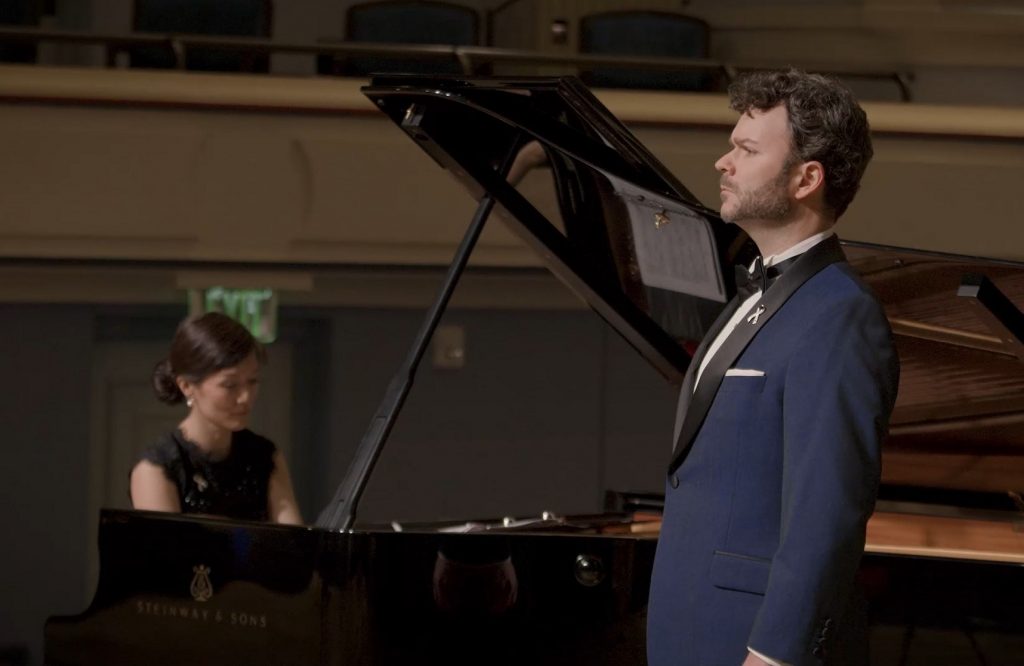Hopkins presents powerful new Heggie work in recital for Vocal Arts DC

Baritone Joshua Hopkins and pianist Myra Huang performed a streamed recital for Vocal Arts DC. Photo: Arts Laureate
Music history is full of new music that fizzled out, and the experience of hearing a world premiere today can often be disappointing. Not so in the case of Songs for Murdered Sisters, the powerful new work by Jake Heggie.
A stunning performance of the song cycle by Joshua Hopkins and pianist Myra Huang was the centerpiece of the Canadian baritone’s streamed recital for Vocal Arts DC, recorded at Rice University’s Brockman Hall for Opera in Houston.
The impact of this rendition lies partly in the deeply personal nature of the work for Hopkins. The singer’s older sister, Nathalie Warmerdam, was murdered in 2015, part of a brutal rampage by a violent, deranged man in Ontario. As Hopkins recounts in dialogues with Huang between selections, his grief is channeled through eight poems, written by Margaret Atwood, and set to some of Heggie’s most devastating music.
The first two songs, linked together by a lamenting vocalise (“Oh”), draw on a poignant harmonic idiom, generally in the minor mode but fraught with dissonance. The music frames the terrible grief following the murder, a spare style of direct and effective words, in “Empty Chair” and the guilt of the survivor in “Enchantment.”
Huang gave stark relief to the third song, “Anger,” with booming chromatic lines in the piano’s lower register. Hopkins evoked the rage of his sister’s murderer, with vocal force on lines like “He was all anger, / The man you tried to love.” This song came uncomfortably close to the details of the event, the roar of the gunshots and the terrified question the victim posed to her killer, “What do you want?”
A shift in tone came with the fourth song, “Dream,” with a child’s innocent song accompaniment, streaked with bitonal clashes, as the background to the singer’s memories of childhood. The most striking song was the fifth, “Bird Soul,” where Hopkins speculated on the question of “If birds are human souls / What bird are you?” Huang brought to life the overlapping bird calls in the treble register, often bitonal like Messiaen’s birds (and many actual birds).
Atwood turned the individual toward the universal in the sixth song, “Lost,” drawing parallels to “so many sisters” lost to such violence over thousands of years. Heggie responded with the farthest extension of the vocal range, and the baritone responded with a howl of outrage up to high G with impressive fortitude and control.
The focus backs away from the universal in the seventh song, “Rage,” in which Hopkins admits to the thirst for vengeance against his sister’s murderer. Huang captured the submerged agitation in the words, with a thunderous cluster produced by running her hand sharply over the bass strings inside the piano, a gesture that punctuated the song several times.
Ending with this dark song would have accentuated something other than the hope for forgiveness and peace, ultimately expressed in the eighth and final piece, “Coda: Song.” The dreamy children’s song-style accompaniment returned, something hopeful to hold onto, as Hopkins sang the words “When I am singing this song, you are here.” The piece then dissolved into those emotions one just cannot express, expressed in wordless vocalise and humming.
Seeking something positive to take forward, Hopkins has partnered with White Ribbon, a group that challenges all men to own responsibility to end violence against women. Male listeners are called upon to take the “White Ribbon pledge,” promising to speak out against all forms of gender-based violence.
Hopkins opened with a first half consisting of sets of songs by Schubert, Fauré, and Debussy. In the conversation with Huang, Hopkins attempted to draw a parallel between the sentiments of romantic love in these earlier songs and the impulses toward violence that ended his sister’s life. It seemed, at best, a logical stretch.
Happily it did not affect the beautiful singing in the Schubert set, in which Hopkins rendered “Seligkeit” and “Lachen und Weinen” with power and convincing melodic line. Hopkins’ tightly coiled vibrato occasionally got in the way of the silky legato needed for these kinds of songs, turning the tone shallow and dull in the middle range. “Du bist die Ruh” was calm and undulating, with a solid oaken sound in the climactic approach to high F.
Huang’s fingers danced brilliantly in the fleet accompaniment of “Rastlose Liebe,” set to an exquisite poem by Goethe. Likewise, she gave a questioning quality to the enigmatic harmonies that run through “Dass sie hier gewesen,” evoking the sweet fragrance left on the air by the presence of the beloved. The deepest foray into the bass range was the low G in “Erster Verlust,” where Hopkins’ voice paled slightly.
Greater variety of vocal coloring would have improved the three songs of Fauré’s Poème d’un Jour, in which Hopkins displayed a sort of opaque sameness. Huang provided most of the excitement, in the fluttering accompaniments of the first two songs. In the context of the Heggie song cycle, some of the texts of these songs echoed perhaps the violent twists of an obsessed lover.
Debussy’s Trois Ballades de François Villon were similarly monochromatic, a quality enhanced by the austere harmonic idiom employed by Debussy, perhaps channeling medieval music. The tone was acerbic, even biting, until the needed levity of the final song, “Ballade des femmes de Paris.” In this send-up of the chattering of women in Villon’s home city, Huang’s toccata-like flourishes matched the pattering text and melody from Hopkins.
While encouraging opposition to violence against women is laudable, it felt a step too far for Hopkins to characterize the recital’s first half as examples of “toxic masculinity.” If you find works like “Du bist die Ruh” misogynistic, then why program them in the first place?
This recital streams online through October 19. vocalartsdc.org; 202-669-1463
